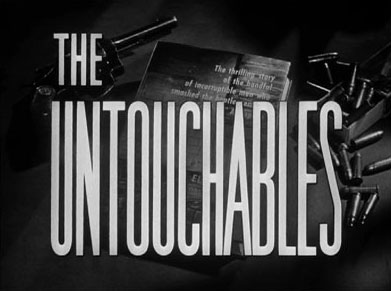
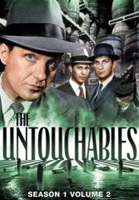 BUY IT AT AMAZON: CLICK HERE!
BUY IT AT AMAZON: CLICK HERE!
STUDIO: CBS/Paramount
MSRP: $38.99
RATED: US = Not Rated, Canada = PG
RUNNING TIME: 14 episodes (11 hrs., 47 min.)
SPECIAL FEATURES:
• "Lucy the Gun Moll" episode of The Lucy Show
The Pitch
Now, thirty to fifty years later, we can call it The Sopranos meets the A-Team (usually in the third act, with guns), but back then, when the black-and-white, right-and-wrong innocence of the Fifties was giving way to the colorful, substance-abusing grab-ass of the Sixties, there was only… The Untouchables!
The Humans
Robert Stack. And that’s pretty much it. Otherwise it’s all supporting parts and guest stars.
Oh, wait! Walter Winchell narrates.
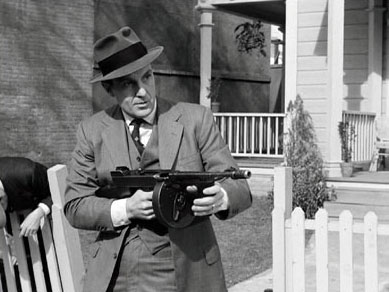
"You won’t catch Grissom or Horatio Caine doing this.
Those sissies only show up after you’re dead."
The Nutshell
A bunch of mob operations, working in the vacuum left behind by the arrest of Al Capone, smoke cigarettes, drink illegal booze, and get busted or shot dead by Robert Stack as Eliot Ness, but we call the show The Untouchables (plural!) anyway, ’cause Stack needs someone to talk to and it’s a better name than A Bunch of Mafioso Goons and Also, At the End, Frank Nitti.
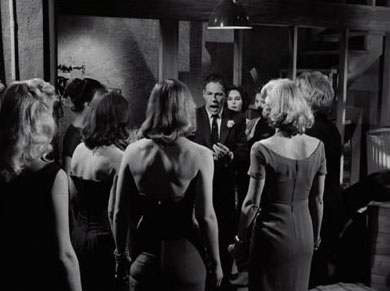
"Ah, come on! Why’d I have to sign up for untouchables?
You ladies are just mean! Mean and evil, I tell ya!."
The Lowdown
Steady yourself for the cliché: We don’t get shows like this anymore. Stale, but true. The Untouchables is a weird formula, usually more about guest-star mobsters than it is about the titular G-Men, of storybook drama usually building up to a bloodless gun battle in which most of that hour’s mobsters typically die. This makes it sort of like a Tales from the Crypt-style show about the small outfits that took up the space left behind by Capone, capped off with an A-Team-style action scene (except The Untouchables actually shoot people dead). But it’s better than that makes it sound.
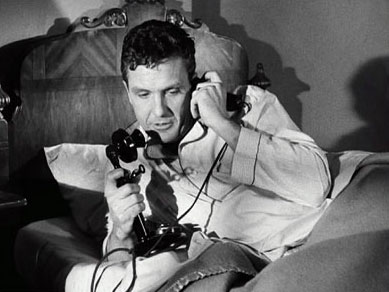
Some weeks they’d just bring a light and prop phone up to
The Stack’s hotel room and knock out his scene for that episode
in five, ten minutes.
The show’s got some of that friendly (even cordial) neighborliness that you might expect from a show out of 1960. People are often very polite to each other.
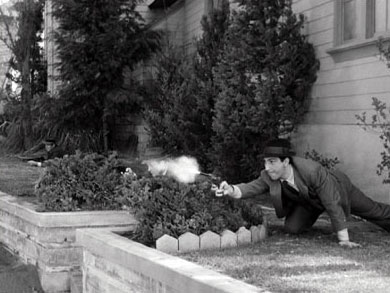
Back in the day, a shrub was all it took to stop a bullet,
and David Schwimmer knew it.
It was a simpler time.
At the same time, this is a show that isn’t afraid to gun down a truckload of Mexican hookers. I’m not kidding. In the episode, "The White Slavers," some gangsters use Tommy guns to get rid of their illicit cargo and save themselves from getting busted at the US border. In "Little Egypt," a sweet (and crazy boozy) blonde dame gets shot twice in the head, point-blank, for turning rat. It’s like The Sopranos with fedoras, sometimes.
It’s weird to watch a fifty-year-old show like The Untouchables, itself set thirty years prior to its filming, and see what we as a television audience used to choose to care about. The prostitutes in "The White Slavers" are portrayed as poor, mixed-up girls who will finally fly free once they’re free of their mob pimp. (They get free of that mob pimp by beating him to death, but whatever.) People smoke whenever, wherever they like, which would get this show an R rating if it were a movie today. This stuff is trivial, but noticeable. It’s also part of the charm of the show — it’s a relic interesting as a curio half the time and engrossing as a story the other half.
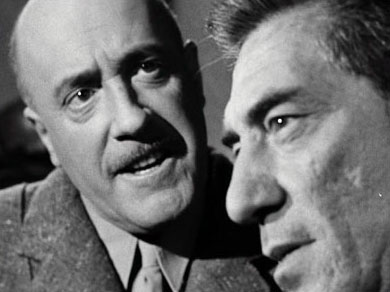
"I want him dead! I want his family dead! I want his house
burned to the ground! I want to drive there in the middle of the night
and… I’m sorry, Vito, but I’ve got to tell you, the do’s looking just
great today. I just love it."
I’m biased toward some of the stuff they did back in the day, not so much because it was how they did it back in the day, but because I think it makes better television. They do some of this stuff on The Untouchables. Scenes play longer. Medium shots are more common. Two or more characters are allowed to occupy the same frame and converse, playing their characters sometimes for a whole minute, before a cutaway. It’s a subtle difference.
Episodes feel a little longer, in addition to actually being a little longer. Stories unfold a little slower, and the course of stories isn’t directed by procedure. This isn’t necessarily better, but it does make the show feel like something new, something fresh, after 47 years. You know what? It feels a little like catching a show on BBC America and thinking, "So this is how they do it over there, huh?"
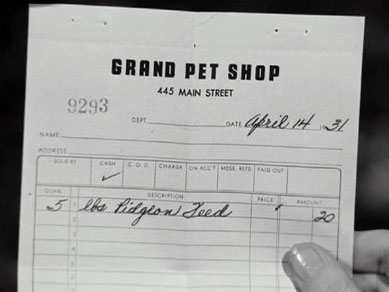
"You numbskull! This isn’t evidence of a stool pigeon.
It’s evidence of pigeon stool!"
(And, no, that’s not how you spelled pigeon back in ’31.
It’s just wrong.)
Yes, sometimes the Then-Now culture clash is just funny. Just weird. That’s still a kind of entertainment.
Point is, you get good mileage out of the 14 episodes in here. They run the gamut from bank robberies to prostitution rings to undercover operations to escort quests, without the comfort or restriction of police procedural conventions to hold it all up. I enjoyed it.
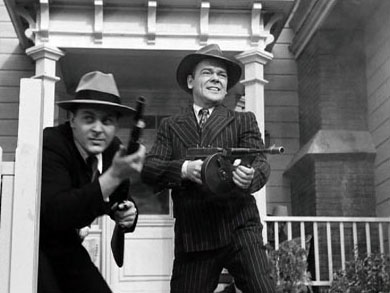
From a rare print of the David Lynch episode.
The Package
Not much here aside from 14 surprisingly great-looking episodes of the show. From the studio back-lots to the many, many apartment and speakeasy sets, the show has a classy theatrical style that doesn’t pretend to be anything other than what it is: A short story played for your entertainment. The only thing lacking is a strong Prohibition-era sound.
With no special features to cook up (or dust off) after fifty years, the folks behind the DVD have at least been good enough to offer us a free episode of The Lucy Show, complete with Robert Stack and a Walter Winchell voice-over. I never cared for The Lucy Show, though.
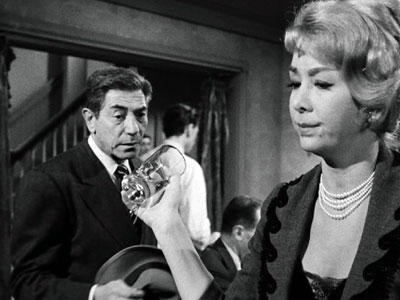
"I have a drinking problem!"*
"Doll, that reference won’t even make sense for twenty years."
This show is what it is, and you get just that if you pick up the DVDs. You know what you’re getting into. If you like this sort of thing, you’ll be happy with what you get here. After watching these, I’m not exactly itching for more episodes, but I do wish I could get one of these to come on the air on Sunday afternoons, now and again.
7.5 out of 10
*This lady’s direction seemed to consist solely of this: "Okay, honey, you’re easy and you don’t know how to hold a glass level. Aaand, action!"